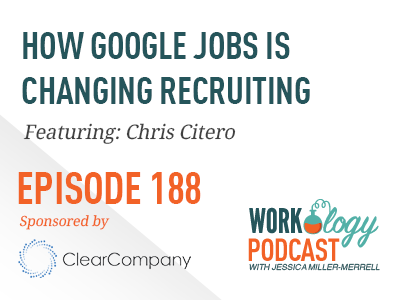According to its 2018 Candidate Experience Report, iCIMS found that nearly 7-in-10 people use Google as part of their typical process to search for open jobs and research potential employers.
More specifically, 83 percent of millennials use Google during their job search, and Gen-Xers (68 percent) are taking advantage of the popular search engine more readily than boomers (53 percent). The biggest question for HR leaders is how this will impact the future of recruiting and is Google for Jobs a can’t live without recruiting strategy for your TA teams?
Welcome to the Workology Podcast sponsored by ClearCompany.
Episode 188: How Google Jobs is Changing Recruiting with Chris Citero (@Citero)
Today I’m joined by Chris Citero, Vice President, Client Architect at TMP Worldwide to get an agency perspective on Google for Jobs. For those that don’t know, Google entered the job aggregator and search space in 2017. It makes sense they would be there since so many people rely on Google for pretty much finding information about everything in their life including jobs near them. Google also in dramatic fashion has all but eliminated free search traffic on its search engine for job aggregators like Indeed. Hence, the reason why Indeed and other aggregators have changed their model. It’s also the reason that Indeed has eliminated free organic job search for staffing companies.
[bctt tweet=”Nearly 7-in-10 people use Google as part of their typical process to search for open jobs and research potential employers. #HR #recruiting ” username=”workology”]
Is Google for Jobs Really Driving Candidates to Career Sites?
Chris gives us the down low on Google for Jobs and what he as well and TMP, a recruitment marketing agency is seeing in terms of traffic to company career sites. I wanted to get an understanding of what is happening and a different point of view from with a broad scope like Chris. While Google for Jobs is important, at present it is only accounting for a small percentage of career site direct traffic. Chris shares about the importance of SEO for employers and what they need to do to attract organic as well as paid targeted candidate traffic to increase conversions and quality of hire.
Chris points out that paid search isn’t a new concept and that for years employers have been using Google Adwords to attract candidates. Programmatic advertising for recruiting purposes and sponsored advertising on social media has increased in use, however, these are only one of many strategies that employers can leverage in their talent attraction efforts. Google for Jobs says Chris is a long game.
Recruitment Marketing’s Role in Recruiting
As TMP is a recruitment marketing agency, they are pro marketing for jobs and postings. Chris sees a growing number of clients using paid media to engage job seekers. He says this is also a long term strategy as employers are focused on building long term relationships and talent funnels versus just a single pay to apply strategy.
Why You Should Include Salary Information on Job Postings
Google for Jobs ranks jobs higher in their algorithm that have salary ranges included so I asked Chris if he this is part of the move towards employers being more transparent with their salary ranges and compensation practices. He says yes and that other review sites and job boards are encouraging and gathering salary data including review sites like Glassdoor. More transparent salary information creates a better candidate experience providing job candidates with a better picture on what to expect with the entire job before they apply.
Conclusion
With Google for Jobs entering the recruitment marketing and advertising space, candidates can now find jobs directly through Google’s AI/machine learning engines, rather than being sifted through a middlemen community of job boards and job aggregators. I’m interested in seeing how Google’s entry changes search habits using search engines but also job boards. It’s going to be interesting to see how the increase of traffic to Google for Jobs impacts the recruiting space and I appreciate Chris taking the time to give us an agency perspective.
Connect with Chris Citero
RECOMMENDED RESOURCES
-
- GAIN ACCESS: FREE HR & Recruiting Job Description Templates
How to Subscribe to the Workology Podcast
You can also click here to find out how to be a guest on the Workology Podcast.
*A special thank you to my production team at Total Picture Radio.









One Comment
thanks for this Post. you write “Google also in dramatic fashion has all but eliminated free search traffic on its search engine for job aggregators like Indeed.” Does this mean that indeed is not allowed to google for jobs? So far i had assumed that they dont want to join this game. curious for your clarification. Alex
Comments are closed.